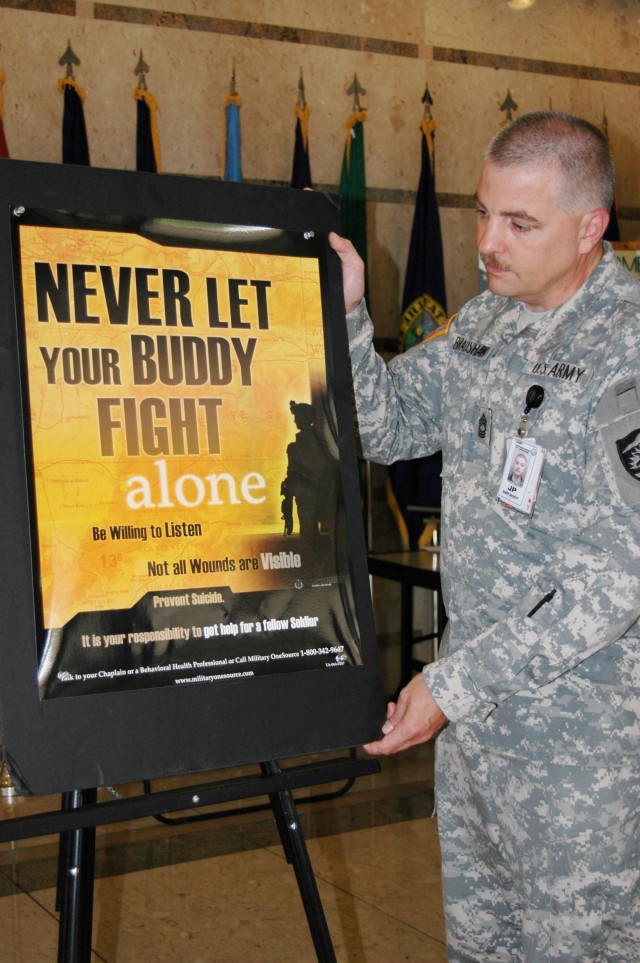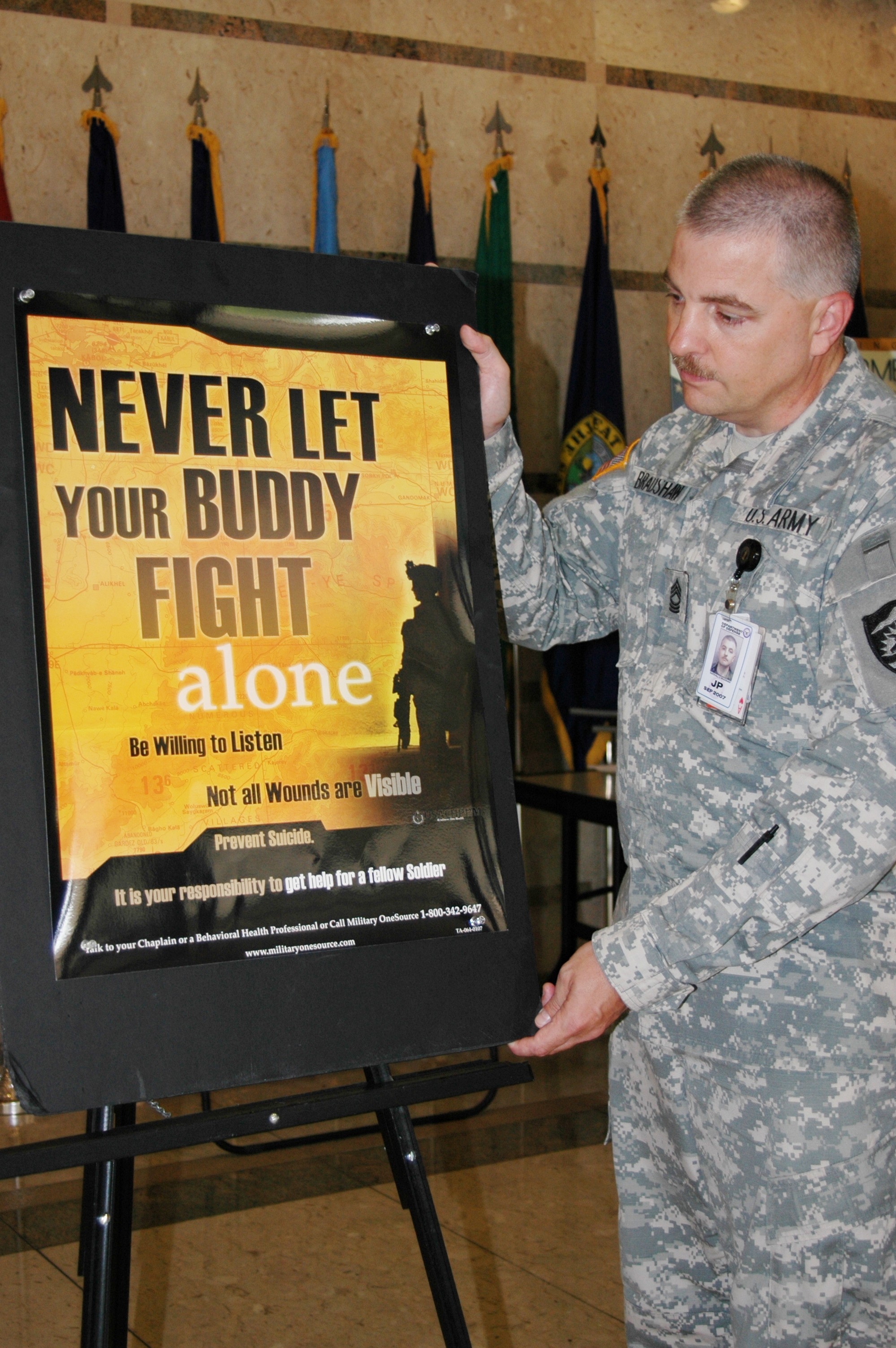
ARLINGTON, Va. (Army News Service, Aug. 20, 2007) - In terms of a threat to Army National Guard Soldiers, it easily rivals rounds from a concealed sniper, the devastation of an improvised explosive device or a blast from rocket-propelled grenade.
The threat doesn't stem from any foreign armed forces or military power, and casualties resulting from this threat are often the saddest and most heartbreaking of deaths for the Family and friends of these Soldiers.
The threat is suicide, which is the No. 3 cause of death for National Guard Soldiers so far this year, according to the Army National Guard's Suicide Prevention Program. In Soldier deaths this fiscal year, there have been 42 cases of suicide in the National Guard, narrowly followed by 47 combat deaths and 45 accident-related deaths.
The Army Suicide Event Report, released Aug. 16, reported 99 confirmed suicides among active-duty Soldiers in calendar year 2006, its highest number since 1991. The National Guard's total of 42 is already 17 more than the 2006 total and marks the highest total since the National Guard began keeping suicide statistics in 2004.
The comparison to the active duty has one major difference though, said Master Sgt. Marshall Bradshaw, the National Guard Bureau suicide prevention manager.
"The active-duty Army has resources and facilities available to the Soldiers 24 hours a day, seven days a week," Master Sgt. Bradshaw said. "They have a greater ability to track information and provide suicide-prevention resources to their Soldiers.
"Providing suicide prevention resources for the National Guard is a greater challenge," he said.
The National Guard's subject matter expert on suicide, Master Sgt. Bradshaw said that current suicide numbers for the National Guard may be skewed high due to recent changes in reporting methods and improved information collection.
"The National Guard appointed its first full-time suicide prevention program manager in August 2006. Until that time, there weren't good tracking mechanisms in place," said Master Sgt. Bradshaw, an Oregon National Guardsman who became the program manager Aug. 1. "We believe much of our information, our increased numbers, is due to better tracking mechanisms.
"However, logic would tend to agree, along with the Army and its increased deployments, that our suicide numbers would increase also," he said.
It's yet to be proven, however, that there is a direct correlation between deployments and suicide. Col. Elspeth Ritchie, the behavioral health psychiatry consultant to the U.S. Army surgeon general, said there is currently little statistical evidence linking suicide with the number and length of Soldiers' deployments.
She did say that said failed relationships are believed to be the cause of 70-80 percent of suicides, and that deployment-linked stress definitely could be a factor behind strained relationships.
Finances and employment issues are two other major causes of suicide, Master Sgt. Bradshaw said.
National Guard statistics reveal that 60 percent of Soldiers who committed suicide this year had been on a previous deployment.
Other National Guard suicide statistics from this fiscal year show that gunshot wounds are the most common method of suicide (67 percent) and lower enlisted ranks make up the majority of suicides (32 of the 42 suicides were committed by the ranks of sergeant and below). Thirty-nine of the 42 suicides this year were committed by male Soldiers.
The National Guard's suicide rate (12 per 100,000) remains about the same as that of the general U.S. population, which is 11.05 per 100,000, according to the Center for Disease Control.
Every Soldier is an important, valuable resource to the military, and the National Guard will continue to prioritize suicide prevention, Master Sgt. Bradshaw said.
In addition to the National Guard's commitment toward funding a full-time suicide prevention program manager, 30 states have now appointed part-time managers as an additional duty. Training for the state suicide prevention program managers is set for the spring of 2008. Also, funding is being pursued to establish a permanent position in each state.
NGB has adopted the Ask your buddy, Care for your buddy, Escort your buddy (ACE) Suicide Awareness and Prevention Training. All National Guard chaplains have been or will be trained in the program at the annual Chaplain Area Sustainment Training this year.
The suicide prevention program will also team with the U.S. Army Center for Health Promotion and Preventative for the release of the ACE Suicide Intervention Program in January 2008, and NGB will host "Train the Trainer" events for all state suicide prevention managers at their training event next spring.
Future plans are to include the training during all National Guard resident training courses at all National Guard training centers around the country.
Lt. Gen. Clyde A. Vaughn, director of the National Guard, has declared September Suicide Prevention Month, and all units will incorporate suicide prevention awareness into monthly training.
Master Sgt. Bradshaw said anyone considering suicide but fearing the stigma associated with seeking help should know that studies have shown careers are not affected by requests for mental-health guidance or counseling.
Anyone considering suicide or who knows someone pondering suicide is encouraged to contact their local chaplain or call the National Suicide Prevention Lifeline at (800) 273-TALK, the civilian suicide prevention number at (800) SUICIDE or military OneSource at (800) 342-9647.
(Sgt. 1st Class Erick Studenicka writes for the National Guard Bureau.)

Social Sharing